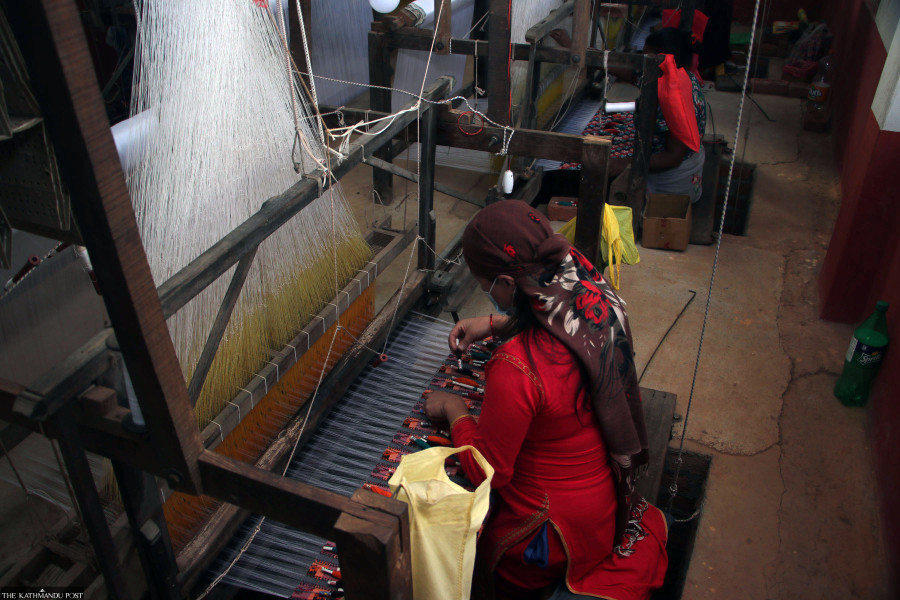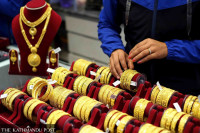Money
Palpali dhaka to be branded to protect local industry
Customers coming to buy Palpali dhaka often mistake foreign fabrics for the local product, textile makers say.
Madhav Aryal
Palpali dhaka maker Purna Maya Maharjan is worried that the locally made fabric may not be able to hold out against the onslaught of imported products.
The brightly patterned handwoven cloth is widely produced in Palpa in western Nepal, which her husband Ganeshman introduced to the district in 1958.
Today, Palpali dhaka has become synonymous with the district, and 84-year-old Purna Maya is determined to keep the legacy alive. One of the endeavours that is being made to save the local dhaka industry is branding.
"We all have a responsibility to protect history," said Maharjan, who is also the president of the Palpali Dhaka Association. “For this, the dhaka industry should support our efforts.”
Maharjan insists that Palpali dhaka and imported dhaka should be sold as distinct products by patenting the design.
Customers coming to buy Palpali dhaka often mistake foreign fabrics for the local product, textile makers say. For this reason, Maharjan has always been stressing that the identity of Palpali dhaka should be protected, they say.
Potential buyers will be able to tell the difference in quality when they come to the market by checking the brand.
"The main thing is that there is no fear of being cheated when buying Palpali dhaka," Maharjan said. "Not only will dhaka cloth get proper value, but it can be supplied in the domestic market and also be exported to the international market," she added.
The history of Palpali dhaka is 63 years old, but the local industry has not been able to grow for lack of proper management. Until two years ago, the dhaka textile industry was not united.
Although there were 12 new dhaka factories, they were not organised. Some of them have shut down. Currently, nine dhaka factories are affiliated with the association.
It has been only two years since dhaka makers joined together and founded the association. They registered the association only after receiving support from the Skill Project, UKAID, the provincial government and Tansen Municipality. For this, Maharjan's son Sagarman Maharjan has taken the lead.
"Since it is difficult to preserve the identity of dhaka, an attempt has been made to unite in view of the concerns of my mother Purna Maya," said Sagarman, who envisioned the Palpali Dhaka Association.
"Now, we are readying to move ahead by branding and labeling dhaka," he said. He said that they had partnered with a funding agency and the government. In recent years, the quality and identity of Palpali dhaka were on the verge of being lost.
The existing factories were closing down. As a result, sales of dhaka products from outside Palpa have increased. Sales of machine-woven dhaka in India have increased drastically.
"There were many cases of customers being deceived," said Purna Maya Maharjan.
In 1958, a Jacquard machine was attached to a handloom which allowed textile makers to produce dhaka fabrics with their distinctive designs.
Maharjan said that preparations to brand Palpali dhaka were being made through the Department of Industry. He said that he was ready to cooperate with Label STEP for fair trade.
Following complaints from customers that they were being fooled into buying imported dhaka instead of the local product, everyone has agreed to brand Palpali dhaka cloth. Hari Rayamajhi, vice-president of the association, said they were preparing to go for branding with quality. Work towards this end is at the final stages at the Industry Department, he said.
"The brand will probably be issued within a month," he said. "Even the Ministry of Industry, Commerce and Supply and the Industry Department are monitoring it," he said.
The brand will be named Palpali. The brand logo is being made separately. Assistance is being provided to obtain international recognition. An agreement has been reached with Image Art Company to get brand recognition for dhaka cloth. It is preparing to bring the first product bearing the brand to market by mid-December.
Manoj Raj Poudyal, secretary of the Palpali Dhaka Association, said that after the branding, dhaka produced in other districts and in India will not be called Palpali dhaka.
"Dhaka needs to be recognised for its quality," he said. "Those who sell low quality dhaka will be discouraged," he added. "Customers will also be able to easily recognise original dhaka."
So far, 98 people have learned to weave dhaka through the association with the help of the provincial government. Also, 75 people have received training in dhaka weaving under the UK Aid Skills Project. Six of the trainees have started their own factories.
Anushesh Rayamajhi, programme officer of the association, said that all the trainees had found jobs in the local dhaka industry. "A total of 343 people have been trained and some are still receiving training," he said.
"Ten persons have also been given training in tailoring besides receiving Palpali dhaka technician training," he said. "Dhaka designing is also being taught, and the persons who have received training do not have to stay unemployed," he added.




 8.93°C Kathmandu
8.93°C Kathmandu













